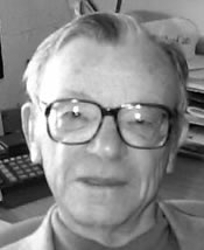

|

|
IN MEMORIAM
Gregory Grossman
Professor of Economics, Emeritus
UC Berkeley
1921-2014
Gregory Grossman, born in July 1921 in Kyiv, Ukraine, passed away on August 14, 2014. Grossman was one of the world’s most highly reputed scholars of the Soviet economic system. He was considered a towering figure in the study of the Soviet economy. His scholarly work shaped the thinking of generations of scholars in the US and throughout the world.
In early 1923 his family fled post-Russian Revolution chaos and famine and took a month-long journey on the Trans-Siberian Railway to Harbin, Manchuria. After completing high school in 1937 in Tientsin, China, he boarded a Japanese ocean liner en route to attend UC Berkeley where he completed his B.S. and M.A., respectively in 1941 and 1943. During World War II, Grossman served as artillery observer with the 731st Field Artillery Battalion during the Battle of the Bulge and completed his war duty in Czechoslovakia. He received a PhD in economics from Harvard University in 1953. He was a faculty member of the Department of Economics at Berkeley from 1953 until his retirement in 1992.
Grossman was the author of several books and many highly influential articles. He made key contributions to the understanding of the Soviet economic system. In a classic article, “Notes for a Theory of the Command Economy” (Soviet Studies, 1963), he coined the concept of the “command economy” to characterize the central planning system, where production and investment were guided by the commands of the communist party elite and where managers at all levels of the planning system strove to implement the commands embodied in the plan targets. In such a system, prices and money play no active role and serve only as accounting units. In such a system, autonomy of agents must be curbed to favor the implementation of plan commands. As his former student, Pennsylvania State University professor Barry Ickes, has noted: “His formulation of the command economy hypothesis provided the framework used by scholars of several generations.”
In an equally famous article “The ‘Second Economy of the USSR” (Problems of Communism, 1977), he also coined the complementary concept of the “second economy.” Because of the imbalances and shortages inherent in a necessarily imperfect planning system, decentralized forms of market exchange, though illegal, were necessary to correct the allocative mistakes of the command system. Grossman worked with professor Vladimir Treml of Duke University and others to conduct more than a decade of research on all aspects of this second economy, gathering massive amounts of evidence based on interviews with emigres from the Soviet Union. He had garnered detailed evidence on the extent of the second economy and on prices of goods and services in various locations of the USSR.
Grossman’s analysis of the Soviet economic system proved extraordinarily prescient. Over time, as the economic system became more complex, the second economy tended to expand and corrode the command system, which eventually collapsed while managers of state-owned enterprises appropriated the assets they controlled in a process of spontaneous privatization. This was the starting point of the transition to the market economy that was studied by the next generation of scholars.
Grossman was awarded in 1991 a lifetime achievement award from the American Association for the Advancement of Slavic Studies. Citing Grossman’s works on the “command economy” and the “second economy,” the award also noted his earlier, path-breaking book, Soviet Statistics of Physical Output of Industrial Commodities (1960), saying that the book “provided the profession with basic rules for working with distorted Soviet economic statistics and avoiding the many pitfalls of that enterprise.”
A colleague at Berkeley, Benjamin Ward, said there was a period in the Cold War of maybe 20 years in which Grossman “was the most knowledgeable person in the world about the Soviet economy.”
Grossman was an appreciated teacher. For decades, he taught the main undergraduate course on the Soviet economic system. He also supervised throughout his career a great number of graduate students who later became themselves well-known scholars of Eastern European economies.
Grossman was a polymath who had a deep understanding of the political, ideological, social and cultural underpinnings of economic life in the Soviet Union. As a result, he was widely sought out by his peers for comments on their scholarship. He was also known to be a consummate gentleman. He remained calm and composed in all circumstances and was known for his great sense of humor and generosity.
Family members said that, while he traveled widely, he had a particular love for Berkeley and the Bay Area’s lifestyle, culture, beautiful vistas and good weather.
In 1952 he married Cynthia Green and they had two children, Joel Grossman of Kuala Lumpur, Malaysia, and Amy Di Costanzo of Berkeley, California. In 1972, he married Joan Delaney, a UC Berkeley professor of Slavic Studies who stayed by his side until his death. He is survived by her; by his two children, six grandchildren and one great granddaughter.
Gerard Roland